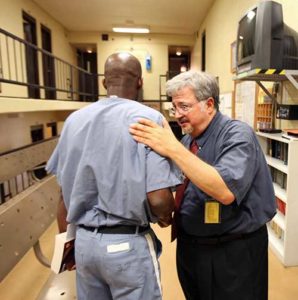ST. FRANCIS — As a Wall Street finance lawyer for two decades, Dale Recinella rubbed elbows with the rich and famous, negotiating deals for, in his words, “every boy’s favorite toys,” including stadiums, airports, seaports and railways.

A replica of a solitary confinement cell, modeled after a cell at Waupun Correctional Institution, is on display during “Concluding the Year of Mercy Behind Bars,” a national Catholic prison ministry conference, Nov. 10-11 at the Cousins Center, St. Francis. (Catholic Herald photo by Joe Poirier)
He had financed prisons all over the country, but had never been inside one. Until the 1990s, that is.
Recinella, of Tallahassee, Florida, shared his journey to being a chaplain on Florida’s death row Nov. 11 with about 220 people attending a two-day national Catholic prison ministry conference at the Cousins Center.
“Concluding the Year of Mercy Behind Bars,” hosted by the Milwaukee-based Dismas Ministry, a National Catholic Prison Outreach, brought together people involved in prison ministry from 31 states, according to Dismas Ministry director, Ron Zeilinger.
In his keynote presentation, “Ending the Death Penalty,” Recinella shared that years ago, during his Wall Street days, he was, in fact, a supporter of the death penalty. His about-face on the issue was gradual, but today, after having seen its horror up close, he is a leading voice against what he calls a “barbaric, archaic practice.”
It was a near fatal flesh eating bacteria illness that Recinella contracted in 1988 after eating a raw oyster that changed his heart.
The near death experience made him reevaluate his life and once he recovered, he decided it was time to give back to God “by taking care of God’s people.”
“We started doing the soup kitchen thing,” in the Tallahassee area, he said, “and we met the severely mentally ill, we met veterans, met the homeless, the unwashed, the undesired, the not-in-my-backyard people.”
Many of the homeless he encountered suffered from AIDS, and at that point, he said, there were no good answers to help people with the disease.
“Some of the medications had symptoms almost worse than the disease,” he said, explaining that he was trained to work with people dying from AIDS, while his wife, Susan, a psychologist, took training to work with their caregivers.
After he spent a couple years working in the streets, Recinella said he received a call from a Baptist prison chaplain asking if he’d come to the prison to minister.
Many of the prisoners were HIV positive and few Christians were willing to reach out to them, he told Recinella.
His initial reaction was to turn down the offer, but his wife and children convinced him to take on the role, something he expected to do a few times and “phase out.”

Catholic chaplain Dale Recinella talks to an inmate at Union Correctional Institution in Raiford, Florida., in this 2011 file photo. (CNS photo/Daron Dean)
He began in August 1998 and in the 18 years since, he’s witnessed 16 executions and been in death watch 33 times.
“What is our standard of care for people holed in six foot by nine foot cages until we kill them?” he asked. “That is a question that no other western democracy in the world has to deal with … we are the only western democracy that still has death row,” he said, adding, “You don’t have to walk these halls long to ask, ‘Why are we doing this? Who thinks this is a good idea? Who is the killing really for?’”
He doesn’t believe anyone could be so cavalier about the concept of the death penalty if they, like he, had witnessed the execution of an innocent person.
“The execution of the innocent — but it does happen — and does happen to people in other people’s families,” he said.[su_pullquote align=”right”]For related story, click here.[/su_pullquote]
Never expecting to be involved in the execution process, Recinella was surprised one day to receive a call from the Secretary of Correction letting him know that a warrant was signed for one of the prisoners and he would need to come to pick up a list of family members.
He learned that part of his job as spiritual advisor “was to make the call to the mother, kids, brothers and sisters to let them know the State of Florida would be executing their loved one, one week before Christmas,” he explained.
He also was with the man in his death house in the cell when the death squad came to get him and was also with him as his witness when he died.[su_pullquote align=”right”]For more information about Dismas Ministry or about how to get involved in ministry to the incarcerated visit www.dismasministry.org.[/su_pullquote]
“I found out at least half of the times his attorney was too busy filing appeals on his behalf, so the only person on the other side of the glass is the spiritual advisor,” he said, explaining family members are not allowed to be present.
After the Recinellas learned that the family is left on their own during this time, his wife began a ministry where she cares for them during the execution.
“Sometimes we are both involved at the same execution; sometimes it’s just her,” he said of their roles.
“One of the things that surprised and shocked us — and it shouldn’t have — is the grief of a mother whose son is being killed by the state is no different than the grief of a mother whose son was killed by crime. Why did that surprise us?” he asked.
As difficult as his role can be, Recinella said he never expected to be witness to the execution of an innocent man.
He described the case as a small town case where the man’s lawyer was related to the judge.
“He was railroaded, and when we finally got real lawyers, and went and investigated the case, we found the person who had done it was the state’s star witness against him,” he described, adding that she even told people what she had done and how she had gotten away with it.
Yet, in spite of these legal errors, the man, who had three daughters in their 20s, was sentenced to die.
Recinella told a heartbreaking story of how each daughter, one by one, came to say goodbye to her father. When her 15 minutes with him was up, each girl couldn’t let go of him.
Rather than having the prison personnel rip them from their dad, Recinella stepped forward and did so himself.
“I literally had to unwrap them from their father and they were so traumatized, they could not walk. I had to carry them across the main hall back to the room where Susan was waiting,” he said, adding that the girls were sobbing, asking, “Why do they have to kill him? Why not let him stay in prison? Why do they have to kill my daddy?”
Recinella said he expected that would be his worst prison experience, but in December 2006, he was present for a botched legal injection execution, something that still torments him.
Angel Diaz, a convicted murderer from Puerto Rico, had been a Cursillista in high school, according to Recinella. He insisted he was innocent up to his death, said Recinella, but in this case, Recinella said he wasn’t sure.
“It was not a case like the other one where it was so clear, I’d say it was 50-50 (whether he was guilty),” he said.
He described Diaz as coming from a huge, Catholic family and his warrant for execution was not expected. It came down a day before Thanksgiving with the execution set for Dec. 13.
After the family’s first death watch visit on Thanksgiving, the Recinellas invited the family – in three vans – to join them for Thanksgiving dinner.
“They gathered around our dinner table, the grandchildren, nieces, nephews, talking about their loved one and I said to myself, ‘Oh, my God, these people are in charismatic renewal; they have other kids in Catholic schools, they are involved in the church; this could be us!” said Recinella.
Within 90 seconds of the execution starting, Recinella said he knew something was wrong. He saw Diaz’s body arch and writhe on the gurney for over a half hour. He later told his wife, “I just watched a man be tortured to death,” he said of the process that created large chemical burns in the convicted man’s skin from the lethal drugs that were injected in soft tissue, rather than directly into his bloodstream as was intended.
According to Recinella, Diaz finally died after more and more chemicals were pumped into his body.
“You will have botched executions if you have the death penalty because human beings make mistakes,” he predicted. “I used to say there is no nice way to kill people, but Pope Francis has said there is no humane way to kill people.
“I’m going to go with Pope Francis’ words,” he said.
